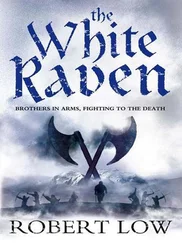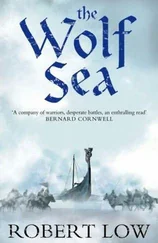He was smiling, as was the boy with him, a lad of about six or thereabouts, so the panic that had gripped us fled. I squinted up at him while others moved quietly, examining the boy's horse and gear, the beautifully crafted mail of the man, the great metal fishscales of his lamellar coat.
We marvelled and questioned. Three years it took to train a cavalryman in the druzhina of a Rus chieftain, we learned. Six for his horse.
The horseman spoke good Norse—East, of course, but most understood him. We admired his two sabres, his lance, the mace that dangled from one wrist, the cased bow.
Àre the Khazars the same?' I asked and he smiled down at me.
`Not so brave or good-looking,' he replied. `But they are the same; all cavalrymen are. You need to be mad to be one and your horse doubly so. It takes the same time to train them—half the army has Khazar blood in them anyway. We always end up fighting our relations in these affairs.'
We chuckled and said it was the same in the north. I tossed him the skin and he drank and gave it back, wiping excess off his moustaches.
Suddenly, Yaropolk was there, with Einar at his stirrup, both scowling.
`Father is leaving, brother,' the pimpled Yaropolk said pointedly to the boy, then flushed and inclined his head graciously to the man. 'Uncle,' he said and we now realised, with a shock, that the boy was young Prince Vladimir and the man Dobrynya, his uncle on his mother's side. The uncle now raised his helmet, slipped it back over his head and then raised one hand in salute.
`Prince Vladimir,' acknowledged Einar and the boy paused as Yaropolk rode off.
Ì like your men, Einar the Black,' he said in a sweet, unbroken voice. Ìf you survive Biela Viezha, we shall speak again.'
And he was gone, leaving us in a cloud of dust. Einar stroked his moustaches thoughtfully.
`What was all that about?' demanded Bersi. Was that really a Rus prince?'
`Kingship was what it was all about,' grunted Einar. 'When you are born to a thrall woman, you need more of it to survive.' Then he bent to a barrel and heaved. 'Back to work, you useless farts.'
As we fell into the rhythm of passing barrel and sack, someone said plaintively, `What the fuck is Biela Viezha?'
The White Castle, the Slav name for the Khazar fortress at Sarkel, was what it was. The great, white-limestone fortress on a dun-coloured rise in a bend of the Don, almost at the Black Sea was what it was. The greatest insult to the Rus was what it was, for they had to pay ten per cent on every trade flotilla that went up or down from the Black Sea and politely beg for permission to do so.
All the way down the Don, floating gently, poled by yelling, sweating Chud rivermen, we had taunted the accompanying horsemen, who rode and walked their mounts along the north bank of the Don, as sweaty as we were cool.
They were the heavy horse; the lighter ones, the bowmen who rode fat-headed, short-legged, hairy dogs of ponies, were further out, wheeling like flocks of starlings on the far steppe, keeping the Khazar scouts at bay.
If there was any fighting, we never heard of it; we spent most of the time dicing, lazing about, trading fighting tips and hurling apple cores and rye-bread crusts at the luckless, sweating cavalrymen, who took it all in good part, it seemed to me.
But when we saw the White Castle, we knew why they didn't mind. It was dazzling, blinding white and the walls were huge and solid, with four towers and two gates and a bloody great ditch. I had been told that the Khazars had cities of tents and flimsy structures, easily destroyed and just as easily rebuilt. Even their palaces were just mud brick and they lived in them only during the winter.
Not Sarkel. It will come as no surprise to anyone to learn that the Great City had a hand in building it, ever-helpful to balance the power in the area. Sarkel was built with solid pillars and Roman know-how—and now they had sent their cleverest men and their biggest engines to knock it down, which is statecraft to these Romans.
As our boat was manhandled into the shore, one of the horsemen broke away and trotted over to us, peeling off his helmet to reveal a beaming, sweating face with a huge curl of moustache. 'Welcome, sword-brothers,' he chuckled and swept his hand towards the huge edifice squatting on the plain. 'I hope you enjoyed the rest and the apples. Now it is time to play your part.'
We looked at each other, then to those yellow-white walls on which we had to hurl ourselves and no one was smiling when he trotted off, his bellowing laugh drifting back to us, echoed by his companions.
He had to wait to see us suffer, though.
The first days were spent tumbling out everything that had been brought, while horsemen raced off everywhere and dust hazed the world. At night, the cookfires were a field of flickering red blossom.
In two weeks, Sarkel had been cut off and the engineers were doing things with the timbers they'd brought. Spearmen—not the druzhina like us, but the great mass of unarmoured levy, sucked in from every tribe for hundreds of miles—stacked their weapons and dug level pits and raised platforms.
We all watched, fascinated, the first time three of these great efforts lobbed sheep-sized boulders across the steppe at the walls to get the range. They hit with a booming crash and a great puff of dust—but nothing happened; nothing collapsed. Disappointed, we went back to the sweaty, stinking job of scraping and boiling cowhides for glue to help fix the assault towers we would use.
That night, hunkered round our own collection of cookfires, we chewed flatbread, sucked down a good meat-gruel, endured the insects and traded our thoughts back and forth.
`There's no place left to shit,' Bersi complained.
`Sit here,' offered my father.
`Shit,' Bersi clarified. 'No place to shit . I'm fed up with stepping in it, everywhere you go.'
It was true enough. I'd heard the army was anything from sixty thousand to a million men and either could be true, though such a number was impossible to get inside your head.
All I knew was that there were a lot of them and even more animals and women and children. Even for people like us, who'd grown up with shit, things were getting out of hand.
Illugi Godi said there would be trouble over it. People would start to get sick. Einar said that, tomorrow, he would have a place marked out and a pit dug. Everyone would shit there and nowhere else.
`Don't try it drunk,' advised Wryneck, who claimed to have had done this sort of thing before, 'or you'll fall in and stink for a week. If you even get out again, that is.'
But it was Ketil Crow who said what we all wanted to say. 'When are we leaving this?' he growled at Einar. 'Before we get slaughtered on those walls, or die of shit-sickness here, I am hoping to hear you say.'
Einar stroked his moustaches. 'We need to plan it well.'
`Plan what?' demanded Valknut, who was burned dark as a Fir Gorm, the black-men thralls from the very south of the world, so that only his eyes and teeth were seen clearly in the twilight. 'We know where to go—what else is there?'
Òf course,' said that quiet voice from the dark behind Einar. 'That's all you really need, after all.'
She was like a cold wind through an open door. Everyone fell silent under the weight of her renewed presence, but Ketil Crow just half glanced at her, irritated, then spat in the fire. `Do we know where to go?'
he demanded. 'I am wondering why I am following some hag-ridden Finn woman.'
`You think I do not know the way?' Hild challenged, squatting so that her knees came up almost round her ears, the dress pooled in her lap. Her feet, I saw, were neat and bare.
No one spoke, or looked at her long, but Ketil Crow looked from her to where Einar sat, his back to Hild, staring at the fire from under the wings of his hair and saying nothing.
Читать дальше
Конец ознакомительного отрывка
Купить книгу











